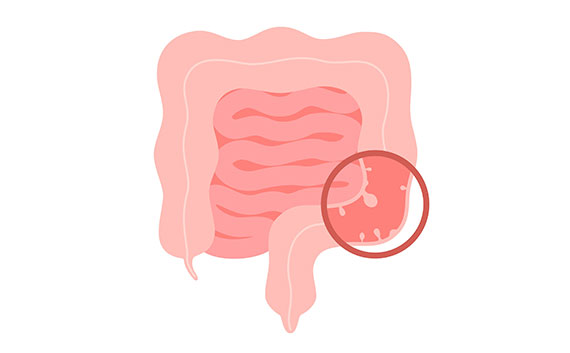Polyps are growths of tissue that often look like bumps or even mushrooms. Typically, a polyp forms in the colon or uterus, but it may develop in other areas, including the ear canal, stomach, nose, and throat.
Finding a growth in these areas can be scary—but most polyps are not cancerous. They are essential to find because they indicate unusual cell growth that can eventually lead to cancer.
How Do I Know if I Have a Polyp?
If you have a polyp, you may not have any symptoms. That’s why it’s critical to have screening tests and colonoscopies regularly.
If you are experiencing any of the symptoms below, it may indicate a polyp, although most of these symptoms overlap with other gastrointestinal conditions:
- Rectal bleeding
- Change in bowel color or habits lasting longer than a week
- Abdominal pain or cramping
If you are experiencing any of these symptoms, are over 45, or have a history of polyps, you should get a screening. The American Cancer Society recently lowered the recommended age for screening from 50 to 45.
How Are Polyps Caused?
Experts are not entirely sure why polyps develop. We know how they develop, but not why. Cells grow and divide when new cells are needed. If cells continue this process even if they aren’t needed, that’s when polyps are formed.
Risk Factors for Colon Polyps
No one is immune to colon polyps. However, some factors may increase your chance of developing them. You are at higher risk if you:
- Are over 45
- Have a family history of polyps or colorectal cancer
- Have other inflammatory gastrointestinal conditions such as Chron’s disease
- Are obese
- Smoke cigarettes
- Use alcohol excessively
- Do not exercise
Unfortunately, your demographics can also increase your risk for colon polyps. For example, males are more likely to develop polyps. Black Americans also have an increased risk.
What Happens If I Have a Polyp?
If your doctor finds a polyp, it will be removed in most cases. If your doctor thinks it has any risk of being cancerous, they may perform a biopsy to see if the polyp is cancerous.
After you have had a polyp, you will likely increase the frequency of receiving a colonoscopy. This is to ensure the polyp doesn’t form again.
When Should I Go to the Doctor?
Up to 83% of Americans with celiac disease are undiagnosed or misdiagnosed. These Americans typically spend an average of $3,964 more than healthy individuals. A visit to the doctor is the best way to see if you are impacted with either celiac disease or gluten sensitivity.
Diagnosis may include trying an elimination diet or blood tests. Getting diagnosed can get you well on your way to feeling much better!

